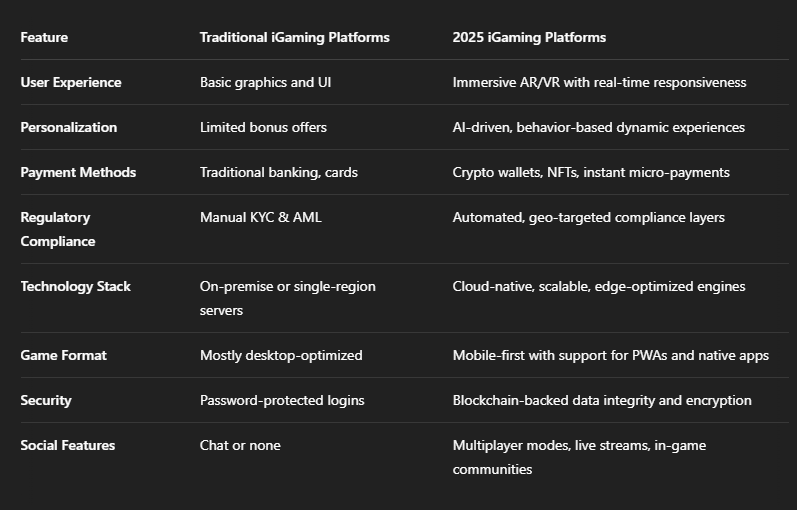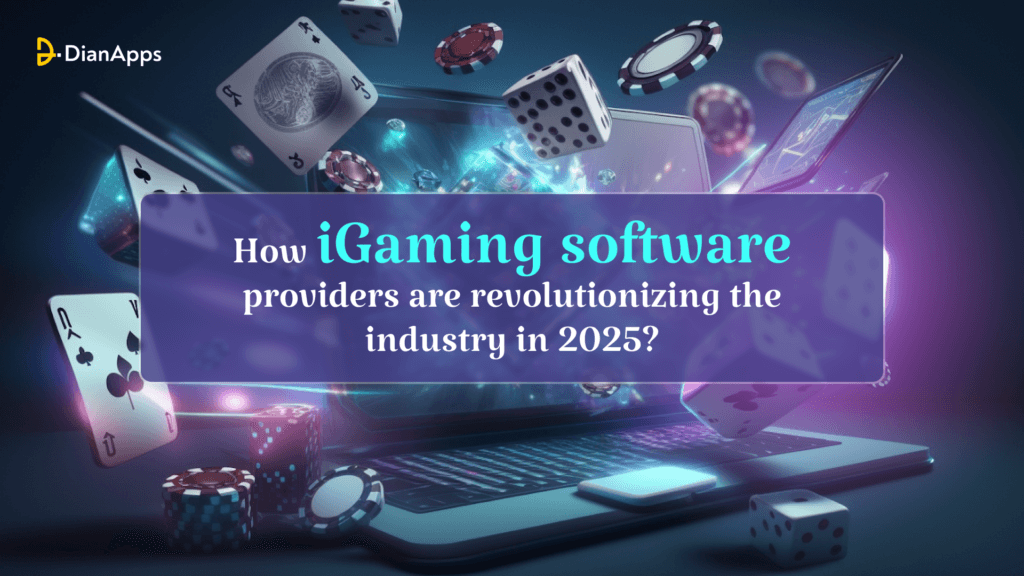The iGaming industry has long been at the forefront of digital entertainment, but in 2025, it’s transforming anything we’ve seen before.
The online gaming market is a goldmine for app developers as it is projected to surpass $100 billion this year. The role of iGaming software providers in 2025 has evolved from mere platform builders to innovation powerhouses driving the entire ecosystem forward.
As player expectations grow for faster, fairer, and more immersive gaming experiences, providers are integrating cutting-edge technologies, such as AI-driven personalization, VR-enabled live tables, and blockchain-backed security, to redefine how people play and engage.
Add to this a fast-shifting regulatory landscape and a mobile-first consumer base, and it’s clear: survival in this arena now hinges on innovation, agility, and compliance.
This blog dives deep into how a leading mobile game app development company is revolutionizing the way online casinos, sports betting platforms, and fantasy games operate, setting new standards for operators and gamers alike in 2025.
The Current State of the iGaming Industry
The iGaming landscape in 2025 is dynamic, competitive, and rapidly evolving. With an estimated 1.7 billion active users globally, the industry has become a digital playground for both seasoned operators and tech-forward startups.
Online casinos, sports betting platforms, poker rooms, and fantasy sports apps are no longer siloed experiences, they’re part of an interconnected entertainment network powered by real-time tech.
A few defining characteristics of the industry today include:
- Cross-platform integration: Players expect seamless gameplay across desktop, mobile, and wearables.
- Hyper-localization: Regional content, currencies, and regulatory compliance are must-haves for global operators.
- Data-driven personalization: From bonus offers to game recommendations, personalization is becoming the default standard.
- Live and social features: Real-time tournaments, live dealers, and in-game chat create immersive and community-driven experiences.
- Increased regulatory oversight: Authorities across the EU, North America, and Asia-Pacific are tightening compliance standards.
Despite these challenges, Game app development companies like DianApps are adapting fast, shaping the industry not just with platforms but with transformative solutions that push the boundaries of what online gaming can be.
Key Innovations Driving the Change in 2025
In 2025, iGaming software providers are not just keeping pace with trends, they’re creating them. From predictive algorithms to immersive interfaces, these innovations are redefining user engagement, operational efficiency, and platform scalability.
Here’s how:
AI-Powered Personalization and Predictive Analytics
AI in iGaming software has become a game-changer. Providers are leveraging advanced machine learning algorithms to analyze player behavior in real time, delivering personalized game suggestions, adaptive difficulty levels, and targeted promotions.
- Tailored gaming journeys
- Predictive tools for player retention
- Enhanced responsible gaming features through behavior tracking
Integration of AR/VR and Immersive Experiences
Virtual casinos are no longer futuristic fantasies, they’re today’s reality. Players can now step into a 3D-rendered roulette room or walk through a VR poker hall, all from their living room.
- Higher engagement rates
- Real-time interaction with live dealers and players
- Next-gen loyalty experiences
Blockchain and Crypto Integration
2025 is seeing widespread adoption of blockchain-based iGaming platforms. From crypto wallets to smart contracts, transparency and trust are now built into the system architecture.
- Instant, borderless payments
- Tamper-proof game results
- Decentralized player authentication
Real-Time Data & Cloud-Based Gaming Engines
Cloud infrastructure and edge computing are now central to the iGaming experience. Real-time leaderboards, dynamic odds, and on-the-fly updates are made possible through scalable cloud gaming engines.
- Reduced latency across geographies
- Seamless multiplayer interactions
- Scalable, cost-efficient infrastructure
How iGaming Software Providers Are Adapting to Global Regulations?
As the iGaming industry continues to expand across borders, regulatory scrutiny is becoming increasingly complex and unavoidable. In 2025, compliance isn’t a challenge; it’s a core feature.
A leading software development company like DianApps is reengineering its platforms to meet evolving legal frameworks without compromising on user experience.
Localized Compliance Frameworks
To cater to a global audience, software providers are building geo-targeted compliance systems that automatically adapt to the specific rules of each jurisdiction, be it Europe’s GDPR, the UK’s Gambling Commission, or India’s legal grey zones.
- Auto-flagging for region-restricted games
- Country-specific age and ID verifications
- Dynamic legal disclaimers and terms
Integrated KYC & AML Solutions
Know Your Customer (KYC) and Anti-Money Laundering (AML) checks have become seamless parts of the user onboarding experience, thanks to AI and third-party integrations.
- Biometric verification and real-time document scanning
- Behavior-based fraud detection
- Instant reporting to regulators
Transparent Data Management
Data protection laws are tightening worldwide. iGaming platforms now rely on blockchain-backed logs, encrypted storage, and real-time data audits to ensure total transparency and user trust.
- Enhanced player confidence
- Reduced regulatory risk
- Secure data sharing between partners
By embedding these regulatory layers into their core technology, iGaming software providers are not only staying ahead of legislation, they’re building platforms that operators and players can trust.
What is the Role of Mobile-First iGaming Platforms?
In 2025, the phrase “mobile-first” isn’t a trend; it’s the industry standard. With over 70% of online gaming revenue now coming from mobile devices, Gaming software developers are prioritizing mobile optimization at every stage of development, from UI/UX design services to backend scalability.
Responsive, Intuitive Interfaces
Today’s players demand frictionless gameplay, and that starts with a seamless interface. Mobile-first platforms focus on touch-friendly designs, one-click navigation, and ultra-fast loading speeds.
Progressive Web Apps (PWAs) & Native App Support
Progressive Web Apps allow users to play instantly, without downloads, while native apps enhance performance and offline functionality. Providers are building both to cover all user preferences.
Optimized for Low-Bandwidth Regions
Global expansion means catering to users beyond urban centers. Providers now focus on lite versions of games and adaptive streaming to ensure a quality experience even with limited connectivity.
With mobile-first strategies at the core of development, iGaming software providers are ensuring that users can enjoy fast, flexible, and immersive experiences anytime, anywhere.
Also understand the mobile game app development process.
Traditional vs. 2025 iGaming Platforms: A Quick Comparison

Conclusion & Future Outlook
The iGaming industry in 2025 is no longer a digitized version of casinos, it’s a technology-first entertainment ecosystem. From AI personalization to decentralized architecture, today’s custom software development company is doing more than adapting, they’re leading a revolution.
Looking ahead, we can expect:
- Hyper-personalization at scale, fueled by real-time data modeling
- Decentralized game hosting and token economies
- Gamified loyalty systems that blur the line between gaming and engagement
- Metaverse-ready gaming spaces with avatars, VR lounges, and multi-dimensional gameplay
Operators who align with future-focused software providers will be the ones shaping, not chasing, the next wave of iGaming.










Leave a Comment
Your email address will not be published. Required fields are marked *